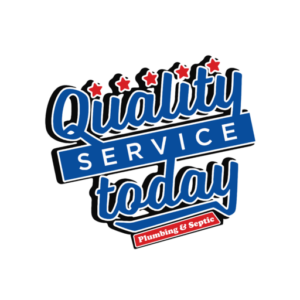The dangers of using chemical drain cleaners
When you have a clogged drain, it’s easy to turn to chemical drain cleaners. But, are you aware of the dangers of using drain cleaners? At Quality Service Today, we don’t recommend pouring chemicals down your drain. Here’s a look at the dangers of using drain cleaner.
Behind the Scenes: The Science of Chemical Drain Cleaners
Drains can often become clogged with soap scum buildup, hair, grease, or any other material that finds its way down your home’s drains. To help clear your home’s clogs, there are three main drain-cleaning solutions on the market today – caustic (chemical), oxidizing, and acid drain cleaners. Small clogs are usually pretty easy to deal with using a caustic or oxidizing drain cleaner. Major clogs sometimes require a little something “extra,” which is when an acidic cleaner may be deemed necessary.
Here is a look at the different types of drain cleaners available.
1. Caustic
Caustic drain cleaners contain chemicals such as lye, bleach, and caustic potash. These chemicals give electrons to the clog-causing material, and then their hydroxide ions produce a heated reaction which helps to clear the drain. The intense heat that is produced transforms the clogging material into a soapy, sudsy substance that can then be easily sent on its way. Caustic drain cleaners are typically found on store shelves in liquid form.
2. Oxidizing
Oxidizing drain cleaners contain ingredients such as bleach, nitrates, and peroxides. Unlike caustic cleaners, which give electrons to the clogging material, the chemicals present in these cleaners take electrons away. This process is known as oxidation which breaks down organic material. The nitrates go to work on dissolving the material, and intense gas and heat are produced, which helps to release the clog and move it along.
3. Acid
Because the main component found in acid drain cleaners is sulfuric acid, this type of cleaner is not commonly found on store shelves. In fact, some are only sold to plumbers and professionals due to the potential dangers that can occur if not handled properly. Acidic cleaners work by creating hydronium ions which then attract electrons from the clog. This produces a heated reaction that helps to melt the clog.
The Toxic Truth: The Real Dangers of Chemical Drain Cleaners
Due to the immense amounts of heat that most drain cleaners produce in order to free a clog, your home’s pipes and plumbing may suffer. Most plumbing today involves PVC plastic pipes which can become too hot and begin to soften, warp, or even melt. Even metal pipes are susceptible to damage and corrosion from drain cleaners. When introduced to intense heat and pressure, metal pipes may crack or burst, creating a new problem in your home.
Not only are the chemicals in these cleaners harmful to your plumbing, but they are also very harmful to your health. When these cleaners are used, they produce chemical reactions which release harmful chemical fumes into the air. And that chemical-laced air can be breathed in by you or your family. These cleaners can also damage your eyes, skin, and mucous membranes. Some of the chemicals used are even strong enough to eat through your clothing if not used with care.
Plumbing systems that include septic tanks are also affected by these chemical cleaners. The bacteria that thrive in your septic tank and break down organic material can be killed and render your tank ineffective. Drain cleaners can also end up in the natural world, affecting everything from groundwater to plants, wildlife, and even air quality.
Clog-Free without Chemicals: Safe and Effective Drain Cleaning Alternatives
Using hot and cold water is a simple and chemical-free alternative that you can try for clearing a clog. First, pour very hot water down the clogged drain to help loosen whatever is causing the blockage. Next, pour the cold water down to attempt to flush it out. A natural drain cleaner solution you can try is to use baking soda and vinegar. Simply pour the baking soda down the drain, followed by the vinegar, and allow the mixture to sit overnight. If the chemical reaction from the combination of the two products works, the clog should be easily flushed away the next morning. These methods can be effective for clearer small clogs.
For more stubborn clogs, you can try using a plunger or a drain snake. A drain snake is a tool that uses a long piece of metal with a coiled wire at the end, which works to break up clogs. Enzymatic drain cleaners are another good option to clear the pipes without using harsh chemicals. Using enzymes and bacteria to unclog drains, these cleaners break down organic materials without harming you or the pipes of your home.
For homes that experience constant buildup and clogs, hydro-jetting can be a long-term solution you may want to consider. This process involves a commercial-strength machine that uses a guided hose to blast away blockages and debris.
The Final Flush: Ditching Chemical Drain Cleaners for Good (conclusion)
When your home is experiencing a clog, it can be easy to reach for the quick fix that chemical drain cleaners can provide. But now that you also know the harm that these cleaners can cause, you can also weigh the true cost of using such a cleaner to clear your home’s drain.
If you have tried these solutions and still can’t get your pipes unclogged, give the experts at Quality Service Today a call. We are located in Durham and Mebane, NC, and serve our local community with reliable plumbing services. Contact us today to schedule your next drain cleaning!

